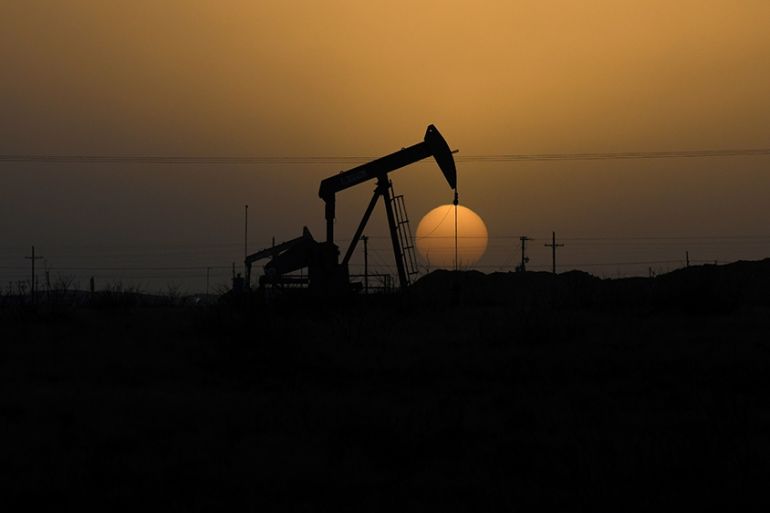Trump hosts oil execs at White House to discuss market slump
Trump said on Thursday he had made no concessions to Saudi Arabia or Russia and did not agree to a US production cut.

United States President Donald Trump met with oil company executives at the White House on Friday afternoon to discuss a historic oil-price slump that threatens their businesses and that was brought on by the coronavirus outbreak and a Saudi-Russia price war.
“We’ll work this out and we’ll get our energy business back,” he told reporters while surrounded by cabinet members, oil-state lawmakers and executives from big drillers such as Exxon Mobil, Chevron Corp, and Continental Resources prior to the beginning of private talks.
Keep reading
list of 3 itemsTrump signals oil price war truce as Saudis call OPEC+ meeting
White House mulls tariffs on Saudi crude to aid US shale oil: WSJ
The administration may offer ways to help the industry weather the crisis, including waiving royalty payments from drillers for oil produced on federal lands, imposing an import tariff on foreign crude oil, and easing shipping regulations, according to sources familiar with the matter.
Trump was also likely to highlight his efforts to push Moscow and Riyadh to end their price war and tighten their taps, the main hope for an ailing US drilling industry that supported his presidential campaign.
“I think President Putin and the crown prince want something to happen badly – certainly it’s terrible for them what’s happening, too. So, they want to see something happen,” Trump said before the meeting began.
Trump said on Thursday that Saudi Arabia and Russia had agreed to cut output by an unprecedented 10 million to 15 million barrels per day, which represents 10 to 15 percent of global supply, after he discussed the issue with their leaders.
The countries did not confirm the plan, but said they were willing to discuss ways to stabilize the market with other major world oil producers.
Trump said on Thursday that he had made no concessions to Saudi Arabia or Russia and did not agree to a US production cut. A US official told Reuters on Thursday that the slide in prices had already led drillers to reduce production for economic reasons.
Normally any coordinated decision by US oil producers to reduce output to boost prices would violate antitrust laws. But if the federal government leads the charge, such an effort would arguably be legal, said Barbara Sicalides, an antitrust expert at Pepper Hamilton LLP.
The US, in recent years, has become the world’s biggest oil producer, at times putting its exports in competition with Russia and countries in the Organization of the Petroleum Exporting Countries, even as Washington imposes sanctions on OPEC members Venezuela and Iran.
Global oil prices have plunged by roughly two-thirds this year, raising the spectre of a wave of US oil drilling bankruptcies and layoffs.
The American Petroleum Institute (API), which represents the US oil and gas industry, had asked Trump for regulatory relief to ensure steady supplies during the pandemic. The administration has since announced a temporary easing of environmental enforcement.
The API, many of whose members operate globally, has opposed the idea of an oil import tariff, which could hurt domestic refiners and complicate projects and business relationships across borders.
Two sources familiar with the matter said Trump would host a teleconference with scores of smaller independent drillers following his in-person meeting Friday afternoon.